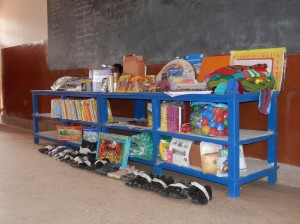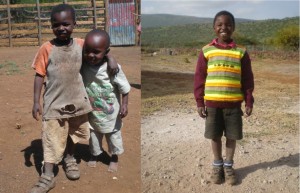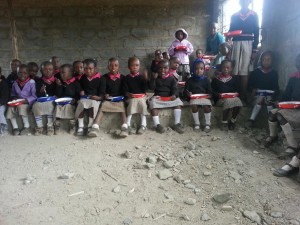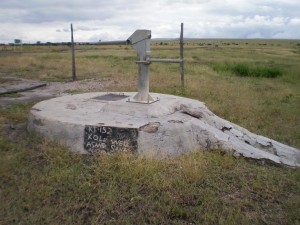June, the start of the cold season. Ok, it’s cloudy but 21 degrees doesn’t really warrant the Maasai huddling up in hats, gloves, fleeces and blankets.
We bring 458 books (many are donated), maths equipment, technology and lots more for the school – a real challenge to our muscles and suitcases. Bringing these much needed school goodies on every trip does have a downside. Unknown boys stop us and say “where is my football?” A woman says “you promised me a mobile phone”. The Maasai are a happy tribe, content with few possessions. Alarm bells ring. We can’t provide a decent education without basic teaching equipment but equally we don’t want to change their culture by creating want. We have to get the balance right.
All these items were carried in 4 suitcases
The bad taste left by the request for a football etc is easily banished by the daily containers of milk brought to our hut by parents of the school children – their way of welcoming us and saying thank you. They are so warm and generous in sharing the little they have.
We like to pay school fees direct to a school but now and then this isn’t possible especially with secondary schools. We can’t give money to a parent unless the fees are due immediately. As we said before, the Maasai can’t keep money in their pockets as there are too many conflicting requirements. Going to bed hungry or a medical emergency would soon eat it up. They have good intentions to put the money back into the school fees pot but it might not happen in time for the start of term.
Dadio in 2010 and now in a smart new jumper
Sometimes we are reminded how sponsorship can transform lives and bring simple, practical benefits to the family. The above photo is of Dadio, one of the orphans we started sponsoring in 2010 after his mother and grandmother died. He is enjoying life at the school. Another of our sponsored children is the only literate person in a polygamist family of 20. His family now relies on him to read the dosage instructions on medicines for their goats.
Here are a few typical costs:
Bananas -4p each
Water – 3p for 20 litres
Leather shoes for children £13
School uniform £13
Tea in a café – 16p
Lunch in a café – 65p
School lunch – 18p (our budget)
Western goods attract Western prices, but local goods and services can be very cheap by Western standards.
The Dining room will soon be finished, thanks to a donor.
We have eaten a school lunch every day this week. Here is the tasty line-up:
Monday Break: tea and dry bread . Lunch: rice and green lentils
Tues Break: maize porridge. Lunch: Githeri (beans and maize)
Wed Break: porridge. Lunch: rice and beans
Thursday Break: porridge. Lunch: Githeri
Friday Break: tea and dry bread. Lunch: ugali (maize meal) and greens. Fruit in season – currently bananas and oranges.
Unfortunately, we just cannot afford meat in the school budget. Most schools, if they serve a lunch at all, will only serve the cheapest, Githeri, every single day.
A favourite food on ceremony days is roast meat – Nyama choma. Nyama means meat. Roger struggles with language. He wonders why everyone falls about laughing when he says he likes to eat “Mama choma” (roast mother).
School with new sign in the middle of the bush.
All at the school is going well, and we thank the hard work of the teachers and governors for this. We had hoped to loan a UK teacher to the school for a term, but unfortunately our plans fell through. The teachers are great, but they do struggle to use some of the teaching aids we bring having had none during their own school days or during their teaching practice.
We see boarding school as a bit of an old-fashioned system of torture but everyone aspires to it here.We have been resisting building a boarding house at the school but are slowly being persuaded it might be a good thing, especially for the girls. Space in huts is limited, visitors are welcomed with open arms and friends and relatives will often have to share beds and floor space with the family. Girls are vulnerable and un-wanted pregnancy is common for many as young as 12. Parents are keen for them to board to keep them safe and in education. Research shows that with an average birth-rate in Africa of 6.3 per mother, this drops to 4.5 if a girl completes primary school and further reduces to 3.4 if she has a secondary education. Education is the key to so many improvements in Africa. We also have many orphans at the school and many will be better off if the school has boarding.
We started our work in 2010 with the installation of a community water pump. Now after a few years of being pleasantly diverted by the school, we are again working on clean water projects. The school now has a bore-hole (or more exactly, an expensive hole in the ground) and we will soon be fitting the solar powered pump and tanks. This will help the school and 1 community but a new initiative we are doing is likely to help thousands of people.
These hand pumps are simple and effective but about 40% are broken in Kenya.
It is estimated that there are about 3500 broken hand pumps scattered across Kenya. Many broke within their first year and have remained unused ever since. We have just started a project to repair, and keep working, as many of these pumps as we can. During this trip, we started a trial run with 10 pumps, soon to be rolled out to several hundred pumps if the trial goes well. Repairing is the easy part. The hard part is giving the communities the necessary skills to maintain and keep the pumps working for at least 5-10 years. So, from a humble beginning of just helping one Maasai community, this charity is starting to help many thousands of people across Kenya.
And for the future? Apart from finishing off the bore-hole, early next year we have to build 2 more classrooms and teachers’ houses. Also, we want to put a community clinic into the school grounds. We hope to build this also in 2014. If we build a boarding house at the school, we must start construction in 2015. So we have a busy few years ahead!
As always, our thanks go to the many supporters, donors and sponsors, as without your help, these project just would not happen.






